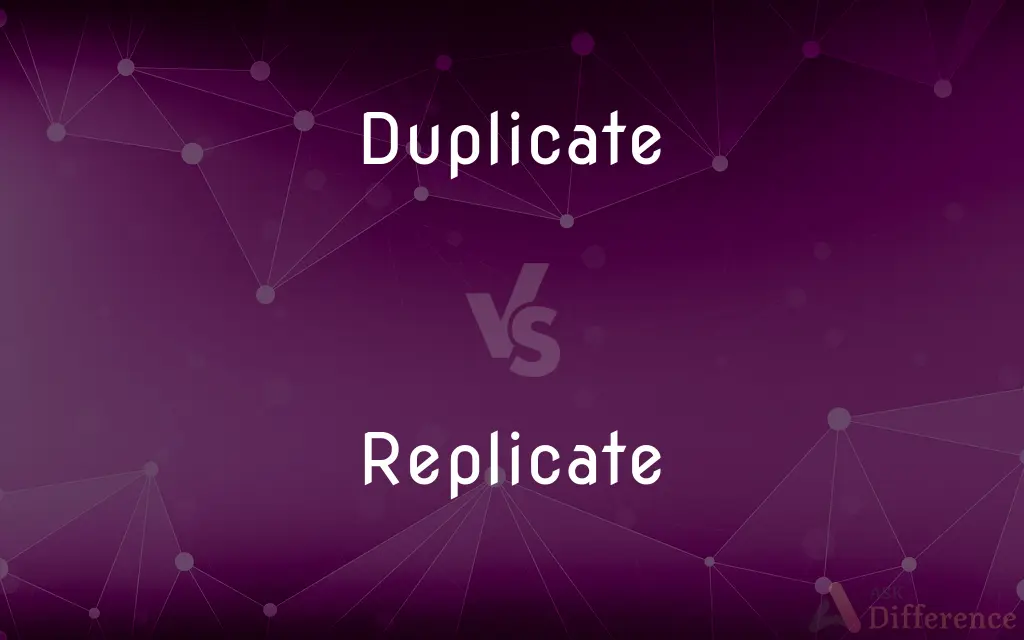Duplicate vs. Replicate — What's the Difference?
By Tayyaba Rehman & Urooj Arif — Updated on March 10, 2024
Duplicate involves creating an exact copy of something, focusing on precision and identicalness, while replicate emphasizes the process of reproducing or repeating under different conditions.

Difference Between Duplicate and Replicate
Table of Contents
ADVERTISEMENT
Key Differences
Duplicates are often created to have a backup or a perfect match of the original, ensuring that every detail is precisely the same. This is crucial in contexts where exactness is non-negotiable, such as in document reproduction. On the other hand, replication involves reproducing something in a new context or environment, which might introduce slight variations due to different conditions or materials used.
While duplication is about creating a mirror image, replication pays more attention to the functionality or outcome rather than the exact physical attributes. For instance, scientific experiments aim to replicate results rather than duplicate them, emphasizing reliability across varying conditions.
Duplicates serve the purpose of replacement, redundancy, or backup, ensuring continuity and reliability in operations or processes. Conversely, replication is essential for validation and verification in research, where results must be reproducible by different researchers under different conditions to be considered valid.
In the realm of data storage and information technology, duplication is a common practice for creating exact copies of data for backup and recovery purposes. Replication, on the other hand, is used to ensure data consistency across multiple locations or systems, supporting disaster recovery and increasing data accessibility.
The process of duplication is typically simpler and more straightforward, as it involves copying something as it is. Replication can be more complex, requiring an understanding of the underlying principles or conditions that need to be replicated to achieve similar outcomes.
ADVERTISEMENT
Comparison Chart
Focus
Exactness and identicalness
Reproducing or repeating under different conditions
Purpose
Backup, redundancy, perfect match
Validation, verification, functionality
Importance in Contexts
Document reproduction, data backup
Scientific research, data consistency
Attention to Details
High, aiming for precision
Outcome-focused, allowing for variations
Complexity
Simpler, direct copying
More complex, understanding of principles needed
Compare with Definitions
Duplicate
A replica or copy that is identical to the original.
She kept a duplicate of her house key with her parents.
Replicate
To repeat a process or experiment to see if the original results can be achieved.
Scientists replicate studies to confirm findings.
Duplicate
The process of copying data or files in exactly the same form.
Backup software is used to duplicate important files.
Replicate
To reproduce or mirror a system or environment in a different context.
The software allows us to replicate the server for testing purposes.
Duplicate
To repeat or double something.
The new policy will duplicate the efforts already made by the previous administration.
Replicate
Involving the reproduction of biological material or cells.
The scientists focused on the replicate growth of cells in culture.
Duplicate
Serving as a substitute or replacement.
The spare tire is an exact duplicate of the original.
Replicate
A reproduction that may not be exactly identical but serves the same function or purpose.
The lab was able to create a replicate of the virus for the study.
Duplicate
To make an exact copy of something.
The artist was able to duplicate the painting perfectly.
Replicate
The act of reproducing or making a copy, emphasizing the process over the exactness.
The museum replicated ancient artifacts for the exhibit.
Duplicate
Identically copied from an original.
Replicate
Make an exact copy of; reproduce
It might be impractical to replicate Eastern culture in the west
Duplicate
Existing or growing in two corresponding parts; double.
Replicate
Of the nature of a copy
A replicate Earth
Duplicate
Denoting a manner of play in cards in which partnerships or teams play the same deals and compare scores at the end
Duplicate bridge.
Replicate
A tone one or more octaves above or below the given tone.
Duplicate
An identical copy; a facsimile.
Replicate
To duplicate, copy, reproduce, or repeat
"recreating his pose for a photo that replicated his glorious moment" (Stuart Miller).
Duplicate
One that corresponds exactly to another, especially an original.
Replicate
(Biology) To reproduce or make an exact copy or copies of (genetic material, a cell, or an organism).
Duplicate
(Games) A card game in which partnerships or teams play the same deals and compare scores at the end.
Replicate
To repeat (a scientific experiment) to confirm findings or ensure accuracy.
Duplicate
To make an exact copy of.
Replicate
To become replicated; undergo replication
Cells that replicate rapidly in culture.
Duplicate
To make twofold; double.
Replicate
A repetition of an experiment or procedure.
Duplicate
To make or perform again; repeat
A hard feat to duplicate.
Replicate
Duplicated, copied, reproduced, or repeated
A replicate sample.
Duplicate
To become duplicate.
Replicate
Folded over or bent back upon itself
A replicate leaf.
Duplicate
Being the same as another; identical, often having been copied from an original.
This is a duplicate entry.
Replicate
To make a copy (replica) of.
On entering a host cell, a virus will start to replicate.
Duplicate
(games) In which the hands of cards, tiles, etc. are preserved between rounds to be played again by other players.
Duplicate whist
Duplicate Scrabble
Replicate
(science) To repeat (an experiment or trial) with a consistent result.
Duplicate
(transitive) To make a copy of.
If we duplicate the information, are we really accomplishing much?
Can you duplicate this kind of key?
Replicate
(obsolete) To reply.
Duplicate
(transitive) To do repeatedly; to do again.
You don't need to duplicate my efforts.
Replicate
The outcome of a replication procedure; an exact copy or replica.
Duplicate
(transitive) To produce something equal to.
He found it hard to duplicate the skills of his wife.
Replicate
(music) A tone that is one or more octaves away from a given tone.
Duplicate
One that resembles or corresponds to another; an identical copy.
This is a duplicate, but a very good replica.
Replicate
Folded over or backward; folded back upon itself.
A replicate leaf or petal
The replicate margin of a shell
Duplicate
(legal) An original instrument repeated; a document which is the same as another in all essential particulars, and differing from a mere copy in having all the validity of an original
Replicate
To reply.
Duplicate
A pawnbroker's ticket, which must be shown when redeeming a pledged item.
Replicate
Folded over or backward; folded back upon itself; as, a replicate leaf or petal; a replicate margin of a shell.
Duplicate
(uncountable) The game of duplicate bridge.
Replicate
Bend or turn backward
Duplicate
(uncountable) The game of duplicate Scrabble.
Replicate
Biology: reproduce or make an exact copy of;
Replicate the cell
Copy the genetic information
Duplicate
A biological specimen that was gathered alongside another specimen and represents the same species.
Replicate
Make or do or perform again;
He could never replicate his brilliant performance of the magic trick
Duplicate
Double; twofold.
Duplicate
That which exactly resembles or corresponds to something else; another, correspondent to the first; hence, a copy; a transcript; a counterpart.
I send a duplicate both of it and my last dispatch.
Duplicate
An original instrument repeated; a document which is the same as another in all essential particulars, and differing from a mere copy in having all the validity of an original.
Duplicate
To double; to fold; to render double.
Duplicate
To make a duplicate of (something); to make a copy or transcript of.
Duplicate
To divide into two by natural growth or spontaneous action; as, infusoria duplicate themselves.
Duplicate
Something additional of the same kind;
He always carried extras in case of an emergency
Duplicate
A copy that corresponds to an original exactly;
He made a duplicate for the files
Duplicate
Make or do or perform again;
He could never replicate his brilliant performance of the magic trick
Duplicate
Duplicate or match;
The polished surface twinned his face and chest in reverse
Duplicate
Make a duplicate or duplicates of;
Could you please duplicate this letter for me?
Duplicate
Increase twofold;
The population doubled within 50 years
Duplicate
Identically copied from an original;
A duplicate key
Duplicate
Being two identical
Common Curiosities
Why is duplication important in data management?
It ensures data redundancy and backup for recovery purposes.
Is a duplicate always identical to the original?
Yes, a duplicate is meant to be an exact copy of the original.
Can duplication and replication be used interchangeably?
Though sometimes used interchangeably, they differ in context and intent, with duplication emphasizing exactness and replication on reproduction under varying conditions.
How does replication contribute to scientific research?
It validates and verifies results by reproducing them under different conditions, ensuring reliability.
What is the primary difference between duplicate and replicate?
Duplication focuses on creating an exact copy, while replication involves reproducing under different conditions.
Can replication result in slight variations from the original?
Yes, replication may introduce variations due to different conditions or materials.
In what contexts is duplication more favorable than replication?
In document reproduction and data backup where exactness is critical.
Can a replicate function the same as the original?
Yes, replicates are designed to function similarly, though they may not be exact copies.
How does data replication enhance system reliability?
By ensuring data consistency across multiple locations or systems.
What role does duplication play in information technology?
It is crucial for creating exact data copies for backup and recovery.
Why is replication essential in experiments?
It ensures that results are reliable and can be reproduced by others.
How does replication help in disaster recovery planning?
It allows for data and system functionality to be reproduced in a secondary location.
What is a key consideration when choosing between duplication and replication?
The intended purpose, whether it's exactness or functionality in a new context.
What is a practical example of replication in research?
Replicating a study in a different lab to see if the same results are obtained.
Can duplication and replication be part of the same process?
Yes, in some cases, both processes can be used together for different purposes.
Share Your Discovery

Previous Comparison
Sponsee vs. Sponsor
Next Comparison
Donkey vs. JackassAuthor Spotlight
Written by
Tayyaba RehmanTayyaba Rehman is a distinguished writer, currently serving as a primary contributor to askdifference.com. As a researcher in semantics and etymology, Tayyaba's passion for the complexity of languages and their distinctions has found a perfect home on the platform. Tayyaba delves into the intricacies of language, distinguishing between commonly confused words and phrases, thereby providing clarity for readers worldwide.
Co-written by
Urooj ArifUrooj is a skilled content writer at Ask Difference, known for her exceptional ability to simplify complex topics into engaging and informative content. With a passion for research and a flair for clear, concise writing, she consistently delivers articles that resonate with our diverse audience.














































